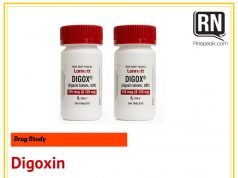Generic Name:Loperamide
Brand Name:Imodium, Imodium AD, Kaopectate III, MaaloxAnti-diarrheal, Pepto Diarrhea, Control
Classifications:gastrointestinal agent;
Pregnancy Category:B
Availability:
2 mg tablets, capsules; 1 mg/mL, 1 mg/5 mL liquid
Actions
Effective antidiarrheal; synthetic piperidine derivative chemically related to diphenoxylate and to meperidine. Reportedly has longer duration of action.
Therapeutic effects
Inhibits GI peristaltic activity by direct action on circular and longitudinal intestinal muscles. Prolongs transit time of intestinal contents, increases consistency of stools, and reduces fluid and electrolyte loss.
Uses
Acute nonspecific diarrhea, chronic diarrhea associated with inflammatory bowel disease, and to reduce fecal volume from ileostomies.
Contraindicatons
Conditions in which constipation should be avoided, severe colitis, acute diarrhea caused by broad-spectrum antibiotics (pseudomembranous colitis) or associated with microorganisms that penetrate intestinal mucosa (e.g., toxigenic Escherichia coli, Salmonella, or Shigella). Safe use during pregnancy (category B), lactation, or in children <2 y is not established.
Route & Dosage
Acute Diarrhea
adult:PO 4 mg followed by 2 mg after each unformed stool (max: 16 mg/d)
child:PO 2–6 y, 1 mg t.i.d.; 6–8 y, 2 mg b.i.d.; 8–12 y, 2 mg t.i.d.
Chronic Diarrhea
adult:PO 4 mg followed by 2 mg after each unformed stool until diarrhea is controlled (max: 16 mg/d)
child:PO 0.1 mg/kg after each unformed stool (usually 1 mg)
Administration
Oral
- Do not give prn doses to a child with acute diarrhea.
Adverse effects
BodyWhole:Hypersensitivity (skin rash); fever.
CNS:Drowsiness, fatigue, dizziness, CNS depression (overdosage).
GI:Abdominal discomfort or pain, abdominal distention, bloating, constipation, nausea, vomiting, anorexia, dry mouth; toxic megacolon (patients with ulcerative colitis).
Nursing implications
Assessment & Drug Effects
- Monitor therapeutic effectiveness. Chronic diarrhea usually responds within 10 d. If improvement does not occur within this time, it is unlikely that symptoms will be controlled by further administration.
- Discontinue if there is no improvement after 48 h of therapy for acute diarrhea.
- Monitor fluid and electrolyte balance.
- Notify physician promptly if the patient with ulcerative colitis develops abdominal distention or other GI symptoms (possible signs of potentially fatal toxic megacolon).
Patient & Family Education
- Notify physician if diarrhea does not stop in a few days or if abdominal pain, distension, or fever develops.
- Record number and consistency of stools.
- Do not drive or engage in other potentially hazardous activities until response to drug is known.
- Do not take alcohol and other CNS depressants concomitantly unless otherwise advised by physician; may enhance drowsiness.
- Learn measures to relieve dry mouth; rinse mouth frequently with water, suck hard candy.
- Do not breast feed while taking this drug without consulting physician.







